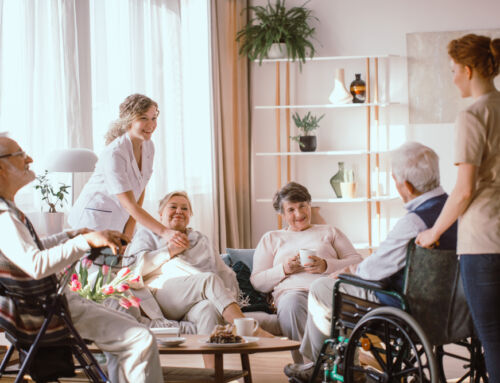I know coronavirus (COVID-19) is top-of-mind and people are worried, for good reason. It’s understandable as we have an increasing number of diagnosed cases and more business and school closures.
Last week, I wrote about how, in general, the senior living industry is better prepared than most other sectors to deal with a highly contagious virus like this one. The reason why? Communities like continuing care retirement communities (CCRCs, or life plan communities) have strict protocols in place to deal with influenza each year, as well as other virulent illnesses like norovirus (which causes stomach bugs).
While COVID-19 is a new and different virus, which appears to be much more serious among older adults in particular, the precautions to prevent community spread are not too different from these other highly contagious illnesses. These protocols are exercised with greater intensity/frequency during a pandemic situation like this, however.
As an added precaution, many communities also are prohibiting non-essential visitors at this time, since people can be infected with COVID-19 and able to spread the virus, but not showing any symptoms. While this is a difficult decision for senior living management to make, it is a wise choice put in place to help protect their residents.
>> Related: How CCRCs Are Addressing the Spread of Coronavirus (COVID-19)
Senior living industry’s precautions are largely working
I read a Senior Housing News article this past week about how COVID-19 is impacting senior housing-related stocks. In Thursday’s big sell-off, the “Big 3” senior housing real estate investment trusts (REITs) were down double-digits, and other REITs with senior living in their portfolios also were down. But evidence thus far suggests thus far that outside of the nursing facility in Seattle there are a low number of confirmed cases within senior living communities. Perhaps some of the concerns that led to the drop in the aforementioned share values are being well-mitigated. The only other instance we are aware of is the isolated and quickly contained case in California mentioned in the article.
While there could be other coronavirus infections that arise in the coming days and weeks, we’ve not heard about anything that merits the level of attention that the facility in Seattle has received. It appears that, in large part, the precautionary measures being taken by CCRCs and other senior living communities, which I mentioned in last week’s post, are working.
National Investment Center for Seniors Housing & Care (NIC) Chief Economist Beth Mace summed up the situation well in the Senior Housing News article. She said, “Operators are taking [the virus] quite seriously to try to prevent the illness from coming into their properties, and this is what senior housing and skilled nursing does, they’re pros at trying to keep the flu out. They’re well equipped, they know how to do it.”
>> Related: Coronavirus COVID-19 and the Stock Market
Staying healthy
I don’t mean to sound Pollyannaish in my optimism. It seems somewhat inevitable that there will be more coronavirus cases found in other senior living communities, especially now that testing is ramping up. And I realize that none of this is easy. Prohibiting visitors, for example, brings on another set of concerns, including loneliness. Yet, in a way much of the world is now heading towards the type protocols that senior living communities already have in place, with social activities being virtually on hold until the spread of the virus is under control. On the positive side, however, I believe the small number of senior housing-connected COVID-19 infections is good news so far.
As a reminder, the precautionary COVID-19 guidance from to the CDC is:
- If you haven’t already, be sure you get your flu shot ASAP so you lower your risk of getting flu.
- Redouble your handwashing efforts, using soap and water for at least 20 seconds, especially after going to the bathroom, before eating, and after blowing your nose, coughing, or sneezing.
- Keep your hands away from your face.
- Avoid close contact with people who you know are ill, and stay home if you are sick.
- Disinfect frequently touched objects and surfaces using a regular household cleaning spray or wipe. (This should include cell phones, iPads, and computer keyboards, all of which can be safely wiped with a disinfecting wipe or cotton ball moistened with rubbing alcohol.)
As an extra precaution, it may also be wise to have a three-month supply of any necessary prescription medicines on hand.
>> For the latest information on COVID-19, visit the CDC’s website.
Photo credit: CDC; Alissa Eckert, MS; Dan Higgins, MAMS






